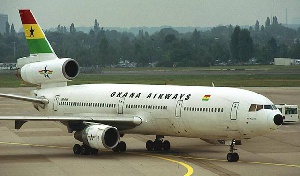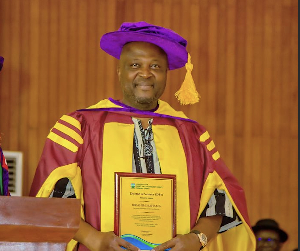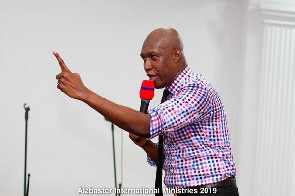A proud Black Star epitomizing everything that is right about the African and what the tenacity of purpose can accomplish, Ghana set up a national airline in 1958--a year after breaking the shackles of colonialism.
For a continent that was repeatedly gang-raped by major European powers for its rich natural resources and human capital to fund the industrialization project of Europe and the Americas, the sight of a plane bearing the flag of Ghana on its tail, was more than a testimony of independence but of the struggle for an independent continent.
For decades, Ghana Airways was the national airline with the Kotoka International Airport (KIA) as its hub. However, the airline -- ridden with debt, ceased operations in 2004. Attempts were made to revive its fortunes but to no avail, and in June 2005 the airline was liquidated.
Government with the support of private investors then established Ghana International Airlines (GIA). The airline faced difficulties and eventually suspended its operations in May 2010. Some loose ends in the liquidation process are still being tightened.
At the ripe age of 59years--at the threshold of retirement-- the country is without a flag carrier. Government now is eager to establish a national airline. The reason for same, according to government sources, is to tap into the growth of the aviation sector in the country measured by the number of internal airlines servicing the Kotoka International Airport (KIA).
President John Dramani Mahama, at the sod-cutting for the construction of the Terminal 3 at the KIA said” the process for the establishing of a new national airline is on-going.”
Government, through the Ministry of Transport, has not hidden its readiness to establish a new national carrier on a public-private-partnership (PPP) model to take advantage of the aviation sector’s burgeoning growth.
The Ministry of Transport, after a tender process, selected PwC -- an international consulting firm -- as the transaction advisor for establishing the new national carrier.
PwC has undertaken various business studies to determine the viability, ownership structure; developing of various models and evaluating bids for establishing the new flag-carrier.
Twumasi Ankrah-Selby, Chief Director of the Transport Ministry is optimistic about setting up a new national airline. “As a government we are going ahead with the arrangement, because we know the importance of establishing the airline for our objective of establishing KIA as an aviation hub,” he said.
Challenges with the new enterprise
The World Bank in July 2015 withdrew its financial support for government’s initiative to establish a new national airline, following a review of the pre-feasibility report prepared by PwC and submitted by the supervising ministry for perusal.
The process to establish a new national airline, after the collapse of the state-owned Ghana Airways, started in earnest in 2014 and was financed using part of a US$30million PPP programme facility from the World Bank.
An initial pre-feasibility report submitted to the World Bank for review and approval -- otherwise termed “no objection” -- came back with the decision not to continue funding the process, as the model contained in the report seem more commercial than a PPP arrangement.
Mr. Twumasi Ankrah-Selby, affirmed the WB decision last year saying: “The process is still on-going. We have had discussions with the bank and they had a different position as to where we are with the study, because we have finished with the pre-feasibility and was going on to the feasibility.
But they felt that following from the pre-feasibility, it was more of a commercial venture than a PPP arrangement. So their thinking at the time was that at this stage the Ministry can go ahead with its commercial arrangement. This is because they try to support PPP arrangements -- but the way the study came out and the approach, it is more commercial than on a PPP basis.
What they are saying is that at the pre-feasibility stage we have identified the path that we should follow. So if we are to go ahead, then we have to finance the arrangement we have. For now, they feel that we should go ahead with the commercial arrangement, therefore they will not be able to continue with us,” he said.
In the proposed new arrangement, government is seeking a carried interest and a partner with experience in running an international carrier.
Questions were however raised by some analysts about the feasibility of some key projections in the draft pre-feasibility report cited by the newspaper. Government is nonetheless optimistic about the success of a new national carrier, given the growing importance and ability of the country to cater for transit passengers and tourist from the sub-region, Europe and the Americas. “As a government we are going ahead with the arrangement, because we know the importance of establishing the airline for our objective of establishing KIA as an aviation hub,” Mr. Selby said.
Possible partners
Sources close to the deal say government is seeking Qatar-based carrier Qatar Airways as the main partner for the proposed new national carrier.
The decision to sound out government’s interest in having Qatar Airways as a partner is deeply rooted in the airline’s financial capacity, network, and technical expertise -- needed to build a viable carrier for the country after two failed attempts.
Though the Request for Proposals (RFP) are yet to be published, the Transport ministry have started some market sounding; meaning that they have already started contacting some airlines and talking.
The final report indicates that the new national carrier will operate for about five years before realising return on investment -- a fair projection in the industry for a start-up airline in this region.
The RFP, which was scheduled to be published by December 2015, is still in the works.
“It is our expectation that by the time they finish preparing the RFP we will have some of these airlines coming in. The only problem is that government doesn’t want to put in any money now, so we want an entity that can bring in the money and establish a carrier.” Mr. Selby said.
Qatar Airways flies to over 150 destinations worldwide in Africa, Central Asia, Europe, Far East, South Asia, Middle East, North America, South America and Oceania from its base in Qatar.
It has cargo operations in various African countries including Ghana and Nigeria.
In the proposed new arrangement, Ghana’s government is seeking a carried interest and a partner with experience in running an international carrier.
Local content
Local airlines initially expressed interest in partnering government to run a new national airline. But their capacity has been called into question. They have had to also contend with high operational cost, dwindling passenger numbers as a result of the imposition of a 17.5 percent VAT on domestic airfares; and an unstable currency. These challenges have taken domestic airlines out of the equation.
“We are not taking out the local operators, but the question is ‘do you have the muscle and the network?’” Mr. Selby quizzed.
Reading on-ground infrastructure
The Ghana Airports Company Limited (GACL), on the strength of its own balance sheet, secured a loan of US$250million from a consortium of banks led by Ecobank Capital.
The GACL last year announced that it was to expand facilities at the Kotoka International Airport to accommodate the increasing passenger throughput and increasing number of airlines servicing the KIA.
Part of the proposal was constructing the third terminal to be known as Terminal 3 within the KIA enclave. “It is not just Terminal Three but also the runway, taxi-ways, the aprons, ground lights, underground fuel lines and runway lights,” Mr. Asare said.
Management of GACL, following the promulgation of the Airport Tax Amendment Act in 2013 -- which allows the GACL to retain 100 percent of its revenues -- turned to private capital to improve aviation infrastructure in the country.
Prior to amendment of the Act, 60 percent of all airport taxes went directly to the Ghana Revenue Authority to support the national budget -- while GACL retained just 40 percent.
Mr. Charles Asare, Managing Director of GACL, earlier told B&FT that the company has set up a special fund solely for airport infrastructure. He said 70 percent of the revenue from its Airport Passenger Service Charge (APSC) will be kept in the fund to service the loan.
GACL has also raised an additional US$150m capital to finance the development of existing regional airports in the country.
The US$150million is to be expended on the rehabilitation of Sunyani, Wa aerodromes; as well as construction of a new airport at the Volta regional capital, Ho.
The establishment of a new national airline, if realized, may come at the threshold of “retirement” but as Dr. Kwame Nkrumah noted: “Those who would judge us merely by the heights we have achieved would do well to remember the depths from which we started.”
Business News of Sunday, 6 March 2016
Source: B&FT













